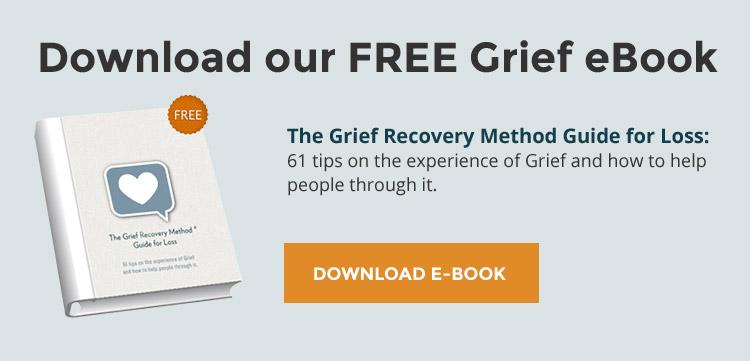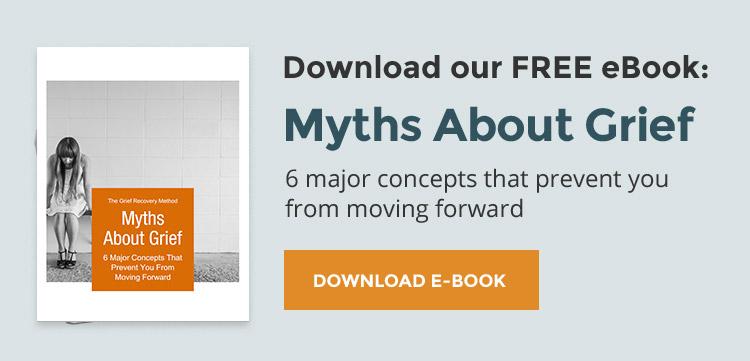
Four years ago, Russell Friedman wrote an article discussing the more than 40 events that can trigger grief in our lives. While this was an excellent overview, much more needs to be said about this subject.
In 1967, Dr. Thomas Holmes and Dr. Richard Rahe, both psychiatrists, researched the medical records of 5000 patients to look at the correlation between their levels of emotional stress and their illnesses. They created the Social Readjustment Rating Scale, also known as the Holmes Rahe Stress Scale, which was used as a scoring mechanism, to rate the various stress indicators as part of their study. This list, commonly known as the Holmes and Rahe Stress Scale, is considered a definitive ranking system.
Defining Grief
At The Grief Recovery Institute, we have often stated that “stress” is another word for “grief.” We define grieve by saying that it’s the result of the conflicting feelings caused by the end of or change in a familiar pattern of behavior. More simply stated, it is the normal and natural reaction to any change that occurs in life.
Russell Friedman, Co-Founder of the Grief Recovery Institute, and Cole James, Executive Director of the Institute, discuss in detail the 43+ Life Events that can result in grief and explore why
The value of a “ranking scale”
While it may be helpful in the therapeutic setting to use a numerical ranking scale in looking at stressors related to their impact on medical conditions, this serves no purpose when used in the context of those events that can result in grief. It’s also important to remember that each individual grieves at 100% for their particular loss. There is no need or value to rate one grief-generating event as being more impactful than another since the grief that each person feels is based on his or her own unique situation.
We have all been in situations where we have heard someone say, “you may think your situation is bad, but mine is even worse!” Comparing losses does nothing to help with recovery. To suggest to Griever A that his or her loss is less significant than that of Grievers B only creates more emotional pain for Griever A, in that they may feel the need to further internalize their feelings, since they have been told they are of lesser value. Our focus has always been that grievers are far better served in taking recovery actions, rather than in arguing over who is hurting the most!
Below you will find the Holmes and Rahe Stress Scale for Adults. In keeping with what we have said above, we have purposefully not included any numerical rankings related to each event.
- Death of a spouse
- Divorce
- Marital separation
- Imprisonment
- Death of a close family member
- Personal injury or illness
- Marriage
- Dismissal from work
- Marital reconciliation
- Retirement
- Change in health of family member
- Pregnancy
- Sexual difficulties
- Gain a new family member
- Business readjustment
- Change in financial state
- Death of a close friend
- Change to different line of work
- Change in frequency of arguments
- Major mortgage
- Foreclosure of mortgage or loan
- Change in responsibilities at work
- Child leaving home
- Trouble with in-laws
- Outstanding personal achievement
- Spouse starts or stops work
- Begin or end school
- Change in living conditions
- Revision of personal habits
- Trouble with boss
- Change in working hours or conditions
- Change in residence
- Change in schools
- Change in recreation
- Change in church activities
- Change in social activities
- Minor mortgage or loan
- Change in sleeping habits
- Change in number of family reunions
- Change in eating habits
- Vacation
- Christmas
- Minor violation of law
- To this, we also feel that it is important to add: Loss of Trust, Loss of Approval, Loss of Safety, Loss of Faith and Loss of Control of my body
Please keep in mind that this list is far from complete in outlining the different issues that can relate to grief. In reality, this list is woefully inadequate, to say the least. It does not cover such events as sexual assault, domestic violence, runaway children or pet loss, to name but a very few grief causing events. Another major issue, that is not addressed, would anything associated with sexuality. By looking at specific situations with any number of grievers, this list could expand greatly.
The other problem with adapting such a list comes in that some of the items listed may be confusing when relating them to grief. Some events, such as marriage may bring to mind more memories of joy than pain. (In this case we need to remember that there is grief associated with changes from normal behavior patterns, of which there can be many in moving from “single” to “married.”) Likewise, this listing for “Christmas” might be better restated as “any holiday.”
The greatest value to this listing is in helping people understand that grief is not just about death. Stress and stressful events come in many packages, which is true for grief as well.
The Stress Scale for Seniors (55 and older)
A slightly modified version of this Stress Scale was created for those over 55, to reflect those life events that come with aging. In many ways this scale is similar to the one for adults, but it likewise fails to mention the same stressors and grief causing events that we noted above.
- Death of a Spouse
- Divorce
- Nursing/Retirement Home Move
- Marital Separation
- Death of Close Family Member
- Major Physical Problems
- Marriage or Remarriage
- Lack of Dreams/Purpose
- Financial Loss of Retirement
- Forced Early Retirement
- Unable to Drive
- Marital Reconciliation
- Normal Retirement
- Spouse Confined to Retirement Home
- Family Member Change of Health
- Gain New Family Member
- Change in Financial State
- Death of Close Friend
- Difficulty in Getting Insurance
- Change in Arguments with Spouse
- Mortgage Over $100,000
- Foreclosure of Mortgage/Loan
- Sense of Not Being Needed
- Outstanding Personal Achievement
- Spouse Begins or Stops Work
- Decreased Contact Family/Friends
- Change in Personal Habits
- Less Contact with Support Groups
- Trouble with Boss/Work
- Minor Physical Problems
- Change in Recreation Habits
- Change in Church Activities
- Change in Social Activities
- Loans of Less than $100,000
- Change in Sleeping Habits
- Change in Family Gatherings
- Change in Eating Habits
- Vacations Christmas
- Minor Law Violation
Grieving Events for Children and Teenagers
Yet another version of this scale was developed for, so called, “Non-Adults.” Just as is the case with the “Adult Scale,” there are many additions that could be made to this list for grieving experiences for children, based on their unique relationships and level of development. This list also fails to include elements of child abuse on any level, sexual matters, bullying and cyber bullying or such things as loss of Safety, Approval, Faith or personal control.
- Death of parent
- Unplanned pregnancy/abortion
- Getting married
- Divorce of parents
- Acquiring a visible deformity
- Fathering a child
- Jail sentence of parent for over one year
- Marital separation of parents
- Death of a brother or sister
- Change in acceptance by peers
- Unplanned pregnancy of sister
- Discovery of being an adopted child
- Marriage of parent to step-parent
- Death of a close friend
- Having a visible congenital deformity
- Serious illness requiring hospitalization
- Failure of a grade in school
- Not making an extracurricular activity
- Hospitalization of a parent
- Jail sentence of parent for over 30 days
- Breaking up with boyfriend or girlfriend
- Beginning to date
- Suspension from school
- Becoming involved with drugs or alcohol
- Birth of a brother or sister
- Increase in arguments between parents
- Loss of job by parent
- Outstanding personal achievement
- Change in parent's financial status
- Accepted at college of choice
- Being a senior in high school
- Hospitalization of a sibling
- Increased absence of parent from home
- Brother or sister leaving home
- Addition of third adult to family
- Becoming a full fledged member of a church
- Decrease in arguments between parents
- Decrease in arguments with parents
- Mother or father beginning work
Taking Action to Deal With This
A very important point to remember is that it is one thing to realize that these are events that can bring stress and grief into your life, and quite another thing to take action. Most people carry around a great deal of grief that they hold inside. Unlike a broken arm or leg that is made obvious by a cast, a broken heart is far less easy to see. As with a broken limb, we take action to heal the wound…action is also needed to heal a broken heart; time alone doesn’t heal a wound, action within time is required.
The Holmes and Rahe Stress Scale was first utilized in looking at the strong correlation between the stressors that impact people’s lives and their actual medical issues. People under stress are more prone to a variety of medical complications. Reducing your stress/grief can have a positive impact on your physical wellbeing.
Our focus, at the Grief Recovery Institute, is in moving beyond the emotional pain of loss. The Grief Recovery Method is a proven, step-by-step process for accomplishing this. It’s designed to help people deal not only with past and current issues regarding the stress of grief, but also to provide the tools to deal with future issues, as they develop.
Concluding Remarks
As was stated before, the value of these lists is in reminding everyone that that there are many life events that can bring with them elements of grief. The Holmes and Rahe Stress Scale offers one of the very few expansive lists of things that can bring stress into people’s lives. In no way do we wish for our readers to see these as the only grief causing events. Given that each individual experiences grief based on their own unique relationships and circumstances, the list of grief causing events could easily number in the thousands or tens of thousands. The title of this article understates this very simply: “Grief: The 40+ Events That Can Be Triggers.”
Photo Credit: 123RF Stock Photo - lculig

























Comments
Anu Silas
woukd really appreciate your help, advice , trainung and prayers.
blessings
Anu
Anu Silas
woukd really appreciate your help, advice , trainung and prayers.
blessings
Anu
Carole Henderson
Add new comment